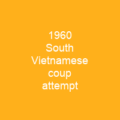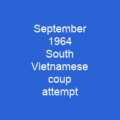A coup d’état is typically an illegal attempt by a military organization or government elites to unseat an incumbent leadership, with half of estimated 457 coup attempts between 1950 and 2010 being successful. Many factors lead to coup occurrences, including the success or failure of the coup-makers’ ability to gain support, the number of successful coups decreasing over time, and failed coups strengthening authoritarian power. Regimes use ‘coup-proofing’ strategies to prevent seizures of power, but this can reduce military effectiveness.
Understanding Coup d’état
The term comes from French, with one early published use in English being an editor’s note in 1804, describing Napoleon’s arrest of French officials. Related terms include self-coups, soft coups (achieved without force or violence), palace coups (involving internal power struggles within a ruling group), and putsch (denoting unsuccessful minority reactionary coups). The term ‘putsch’ was initially used to describe the Züriputsch in Switzerland (1839), Weimar Germany’s attempted coups, Hitler’s Beer Hall Putsch (1923), and other events like the 1934 Night of the Long Knives and the 1961 Algiers putsch.
Pronunciamiento: A Type of Coup d’état
A pronunciamiento is a type of coup d’état where a military or faction deposes the existing government and hands over power to a new, ostensibly civilian government. Barracks revolt refers to a military mutiny that sparks a larger revolt against the government.
Coup Attempts and Their Outcomes
According to data from 1950 to 2010, there were 457 coup attempts, with 49.7% successful and 50.3% unsuccessful. Coup attempts were most common in Africa (36.5%) and the Americas (31.9%), while Europe experienced the fewest attempts (2.6%). A number of political science datasets document coup attempts worldwide, starting after World War II. Examples include Global Instances of Coups and the Coup d’etat Project.
Predictors of Coup Attempts
Successful coups can lead to regime change, with about half installing new autocratic regimes. New dictatorships engage in higher levels of repression after a coup. Democracies are installed in about 40% of post-Cold War coups.
Factors Influencing Coup Attempts
Predictors of coups include ethnic factionalism, supportive foreign governments, leader inexperience, slow growth, and poverty. Military spending is often an indicator of the likelihood of a coup. The accumulation of previous coups is a strong predictor of future coups, known as the coup trap.
Hybrid Regimes and Coup Vulnerability
Hybrid regimes are more vulnerable to coups than authoritarian or democratic states. Terrorism, protests, electoral weakness, inequality between social classes, and small population sizes can increase the likelihood of coups. Succession rules in autocracies also play a role in coup frequency.
Coup-proofing Strategies
A 2013 study found that major coup datasets rely heavily on international news sources, potentially biasing their findings. Coups have become rarer and more likely to be followed by democratization since the end of the Cold War. However, this does not mean that coups always promote democratization. In fact, most coups tend to increase state repression, even in autocratic regimes.
Post-Cold-War Era
The post-Cold-War era has seen an increase in the chances of post-coup democratization, possibly due to international pressure and financing incentives. However, this trend is not consistent across all countries, and more research is needed to determine whether coups promote or hinder democratization.
International Reactions
There is debate among researchers about whether coups should be considered a catalyst for democratization, with some arguing that they can lead to democratic governance, while others believe that the outcome depends on various factors such as international pressure and regime type. The months following a bloodless coup can be bloody.
Risk of Coup in Democracies
A risky coup to change a democratic government is generally considered wrong, but some legal scholars argue that it might be justified in certain circumstances. Incumbent governments rarely violently purge the army after a failed coup, which can trigger a counter-coup by soldiers afraid they will be next.
Impact on International Relations
Governments usually fire prominent officers and replace them with loyalists instead. The international community tends to react adversely to coups, reducing aid and imposing sanctions. Coups are more likely to elicit global reaction when they occur in democracies, after the Cold War, or in states heavily integrated into the international community.
Conclusion
Western states react strongest against coups that pose democratic and human rights abuses. Organizations like the African Union and Organization of American States have adopted anti-coup frameworks. Negative international responses can shorten the duration of regimes created in coups. Coups increase the cost of borrowing and increase the likelihood of sovereign default.

You want to know more about Coup d’état?
This page is based on the article Coup d’état published in Wikipedia (retrieved on December 8, 2024) and was automatically summarized using artificial intelligence.







